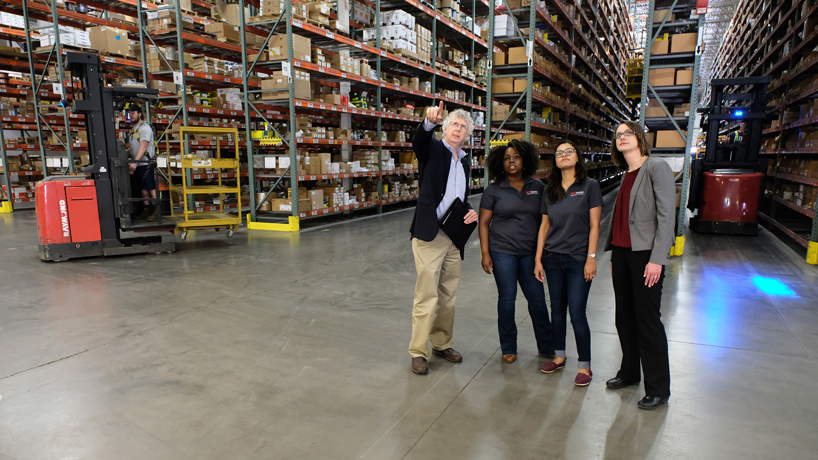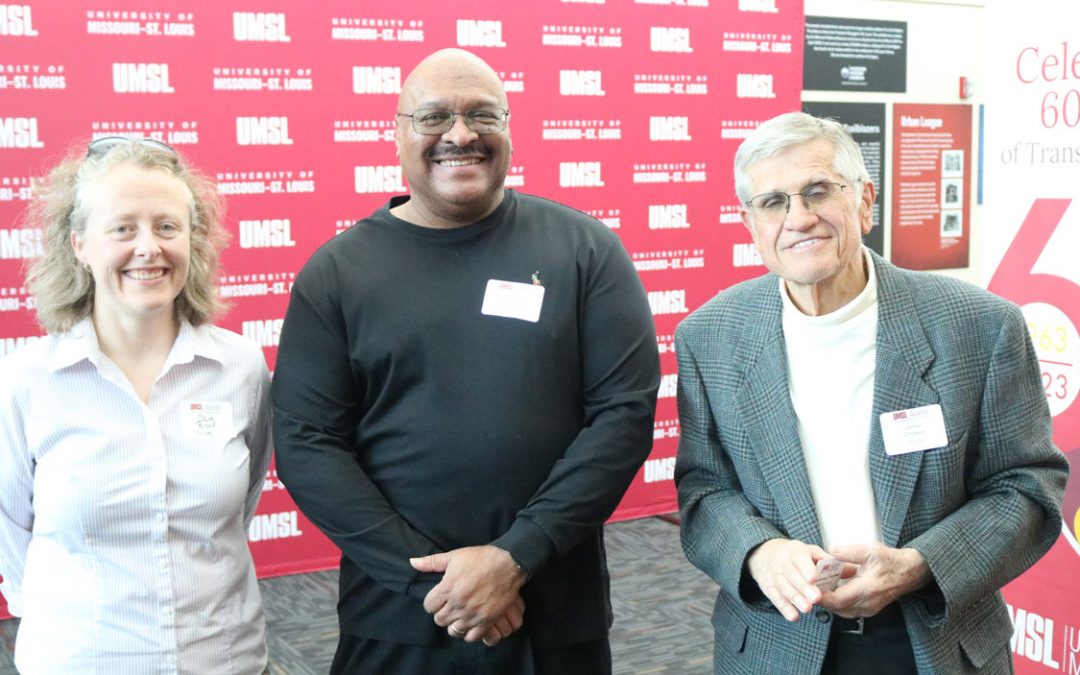
Professor and Department Chair James Campbell (pointing) chats with (from left) Supply Chain Club President Ashlie Vickers, Supply Chain Club Vice President Aditi Tapriya and Assistant Professor Andrea Cadenbach during a tour of Graybar. With the rebranding of the Department of Supply Chain and Analytics, students have additional opportunities to network with potential employers and tour regional facilities. (Photo by August Jennewein)
While working for a commodity trading company in London, Aditi Tapriya knew she needed a career change.
After about two years in finance, she often found her work monotonous and became curious about the growing and supplying of products rather than trading.
“I wanted to challenge myself,” Tapriya said. “I wanted to shift to supply chain and look into growing these commodities, selling these commodities and making them available to the rest of the world.”
After this realization, she began researching graduate supply chain programs and discovered the University of Missouri–St. Louis. Although the U.S. market would be unfamiliar territory for the Delhi, India, native, she decided UMSL’s MBA program provided the challenging educational opportunities she desired.
Even though it’s only been a year since Tapriya uprooted her life and enrolled at UMSL, she has already seen significant developments in the department’s curriculum and many new networking opportunities. She believes this is a result of the name change from Department of Logistics and Operations Management to Department of Supply Chain and Analytics.
The first half of the name, supply chain, reflects the department’s broader mission and the capabilities in supply chain management. It responds to trends in business as the curriculum incorporates logistics and operations, along with procurement, distribution and supplier-customer relationship management. The second part of the new name, analytics, reflects the longtime core mission of using quantitative methods to address applied problems in business.
“The new name better reflects what we do,” Professor and Department Chair James Campbell said, “as well as the importance of the broad field of supply chain management and the continually growing importance of business analytics in this era of big data.”
To start, the department has completely revised the undergraduate major, and the BSBA emphasis will officially transition from logistics and operations management to supply chain management in the 2017-18 University Bulletin.
“The name is more comprehensive and informative,” said Tapriya, who serves as the inaugural vice president of the university’s Supply Chain Club. “Now the students are not questioning, ‘Does this department have something for me?’ With the name itself, it says, ‘Yes, you can come join us.’”
Certificates and minors in business analytics are also in the works for undergraduate and graduate programs. This fall, faculty will revise the graduate curriculum for MBA courses, while continuing to offer a PhD program in logistics and supply chain management.
As part of the revitalization, the department formed an advisory board of respected senior leaders in supply chain. These representatives from 16 leading companies in the St. Louis region assist with a variety of key projects – internships, mentorship, attending and hosting student engagement events, and providing critical input on curriculum and course offerings.
In fact, curriculum changes are largely based upon the board’s view of what students need to meet the supply chain talent gap both regionally and nationally.
“The main advantage to students is a more relevant and up-to-date curriculum based on industry needs that prepares students for success in the field,” Campbell said. “Students now have numerous opportunities to engage with area businesses, especially our advisory board companies, and to learn about the field and careers.”
Tapriya’s mentor Mark Deadwyler has helped adjust her resume for the U.S. market, assisted in her job search and provided advice when selecting a course schedule. Deadwyler, the vice president of finance and global supply chain for Monsanto Company, is also a UMSL alumnus.
“You meet your adviser on a regular basis, and they look out for you in the outside world,” Tapriya said. “The supply chain department actually cares about giving you a relationship with a mentor.”
In addition to the mentorship program, interested students have ample opportunities to network with industry leaders through panel discussions, small group sessions and, most recently, the “Women in Supply Chain Symposium.” The student-led Supply Chain Club also has several events in the works for the upcoming academic year, including facility tours, lectures and quarterly happy-hour meetings.
Ashlie Vickers, a 2017 graduate and the first president of Supply Chain Club, said working as a student leader in the new organization served as both a rewarding and educational experience.
“It is the first opportunity where I felt like I had the chance to give back to students through events that give insight into the world of supply chain and give them opportunities to meet employers,” Vickers said.
Potential students may have caught on to these advantages as the number of undergraduate majors is up 21 percent since fall 2016. This increase continues an upward trend as the number of majors has doubled in the past two years and tripled in the last three.
After a national survey showcased a 93 percent satisfaction rate among supply chain students, it’s clear selecting this field is a positive choice. As an extra incentive, graduates can look forward to a starting median pay of $52,800.
To round out department changes, three new full-time faculty members will arrive on campus this fall.
“These strategic hires have allowed us to both strengthen our core and broaden our coverage to span supply chain management,” Campbell said.
For Vickers, the department’s existing faculty played a critical role in her student experience and sparked renewed confidence within her full-time position at PLZ Aeroscience. In particular, Assistant Teaching Professor Mitch Millstein’s statistics course reinforced her decision to remain in supply chain management.
“I’ve had statistics before and struggled to grasp it,” Vickers said. “His class totally changed my perception of what I could do with the material and how I could apply it to my job, making it incredibly relevant. It just made a big difference in my life. It made me feel like I could really do anything. I can go into the many avenues of supply chain confident that I can apply the material I learned.”















